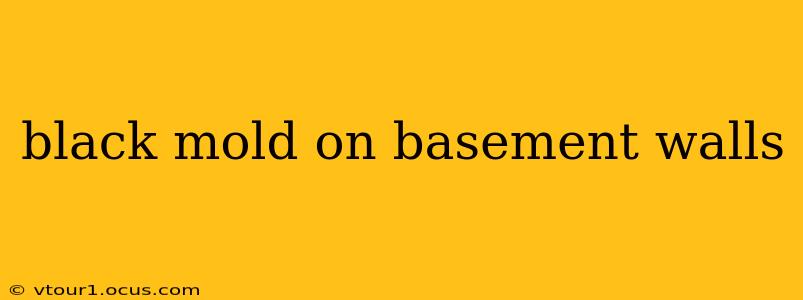Basements, with their often-damp conditions, are unfortunately prime real estate for black mold growth. This isn't just an aesthetic problem; black mold, or Stachybotrys chartarum, can pose significant health risks, particularly for those with respiratory issues or allergies. This comprehensive guide will help you identify, remove, and prevent black mold from taking root in your basement.
What Does Black Mold Look like on Basement Walls?
Identifying black mold definitively requires professional testing, but there are several visual indicators you can look for. Black mold often appears as dark, slimy patches, sometimes with a fuzzy or velvety texture. It can be black, dark green, or even brown. However, many other substances can look similar, so don't jump to conclusions based solely on appearance. Crucially, not all black or dark-colored fungi are Stachybotrys chartarum.
Is Black Mold Dangerous?
Yes, black mold can be dangerous. Exposure to high concentrations of Stachybotrys chartarum spores has been linked to respiratory problems, allergic reactions, and in some cases, more serious health issues. The severity depends on factors like the amount of mold, the duration of exposure, and individual sensitivities. It's crucial to remember that the presence of black mold doesn't automatically mean severe health risks, but prompt remediation is always advisable.
How to Test for Black Mold in Your Basement?
Don't attempt to identify mold solely by visual inspection. The best way to confirm the presence of black mold is through professional mold testing. These tests can accurately identify the type of mold and determine the severity of the infestation. There are DIY mold testing kits available, but their accuracy can be questionable. Professional testing provides a more reliable assessment and can inform the best course of action.
What are the different types of mold testing?
Several methods exist for mold testing. Air sampling measures the number of mold spores in the air, while surface sampling involves taking samples from affected areas. A qualified professional will recommend the most appropriate method based on your specific situation.
How to Remove Black Mold from Basement Walls?
Removing black mold yourself is only recommended for small infestations. For larger areas or if you suspect significant growth, professional mold remediation is crucial. Attempting to clean extensive mold growth yourself can be ineffective and even dangerous, as it could spread spores further.
How to clean small areas of black mold?
For small, localized patches:
- Safety First: Wear protective gear, including gloves, a respirator (N95 or better), and eye protection.
- Ventilation: Open windows and doors to improve ventilation. Use fans to further circulate air, but ensure they aren't blowing spores into other parts of your home.
- Cleaning Solution: Mix a solution of water and a mild detergent, or use a commercially available mold cleaner designed for this purpose. Follow the manufacturer's instructions carefully.
- Scrubbing: Gently scrub the affected area with a stiff brush, working from the outside in to avoid spreading the mold.
- Rinsing: Rinse the area thoroughly with clean water.
- Drying: Allow the area to dry completely.
How to Prevent Black Mold in Your Basement?
Prevention is key to avoiding black mold issues. The following steps can significantly reduce the risk:
- Moisture Control: This is the most crucial aspect. Address any leaks or water damage promptly. Install a dehumidifier to keep humidity levels below 50%. Properly vent appliances that produce moisture, like clothes dryers and showers.
- Ventilation: Ensure adequate ventilation in your basement. Consider installing an exhaust fan or opening windows regularly, especially during damp weather.
- Cleaning: Regularly clean your basement to remove dust, debris, and any potential sources of mold food.
- Seal Cracks and Gaps: Seal any cracks or gaps in walls and foundations to prevent moisture infiltration.
By understanding the risks, employing proper identification methods, and implementing effective prevention strategies, you can significantly reduce the chances of encountering black mold problems in your basement. Remember, if you are unsure about any aspect of mold remediation, always consult a qualified professional.
